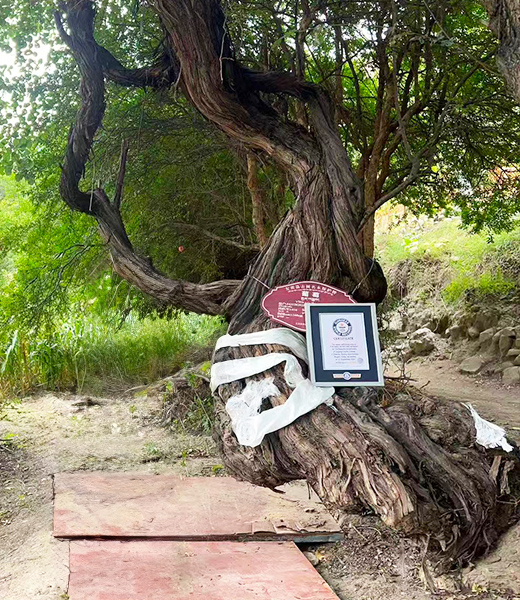(TibetanReview.net, Nov12’25) – A grape vine discovered deep in the mountains of eastern Tibet’s Chamdo (Chinese: Changdu) City has weathered four centuries of wind and frost, becoming the world’s oldest wild living vine, according to the guinnessworldrecords.com Nov 10. The vine was found in the city’s Zuoba Village of Rojin (Tibetan: Rabchen) Township, Zogang County.
Its roots grip the rocky soil of the plateau, and its branches are entwined with the very rings of time, the report said.
This silent witness of history was officially certified by Guinness World Records on Sep 21, as the oldest wild living vine – now 416 years old.
The vine is stated to rise about eight metres high, with a ground girth of 209 centimetres and a trunk diameter of 67 centimetres.

It was stated to have been first discovered during the third survey of ancient and notable trees in Chamdo city. Later, scientists from the Wood Science Research Laboratory at Southwest Forestry University in China confirmed its age through ring analysis and physical measurements, the report said.
Dr Wang Haibo, Deputy Director of the Institute of Fruit Trees at the Chinese Academy of Agricultural Sciences, ha said finding a wild grapevine over four centuries old at an altitude of 2,400 metres is a testament to nature’s patience and life’s resilience. This is more than a world record – it is a living archive of time itself.
While most cultivated vines rarely live beyond 50 years, and those that survive a century are exceptional, in Zogang County, 64 ancient vines over a hundred years old still thrive today, the report said.
In 2004, Zogang was named “The Hometown of China’s Wild Red Grapes,” and 20 years later, its name appeared once again in Guinness World Records, the report noted.
According to scientists, the rings of a grapevine not only record time, but also trace the pulse of climate – the cold and warmth, the dry and the wet. Each line is a whisper of the plateau’s shifting breath. And perhaps, somewhere beyond these mist-covered valleys, even older vines still sleep in the earth, waiting quietly to be found, the report said.


